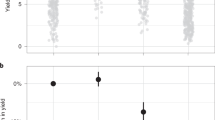Abstract
Risk assessment studies of herbicide resistant sugarbeet have revealed no risks to human health or the environment.Indeed it appears that commercial growth of this crop mightsecure benefits such as decreased pesticide use and increasedbiodiversity. However, widespread resistance to GM crops such asherbicide resistant sugar beet still persists in Europe. It isargued that this is not just because people do not know therelevant facts. Rather it is because popular resistance to GMfood is driven in part by concerns other than the fear ofnarrowly defined risks to health and the environment. These otherconcerns include an aversion to commercial monopoly and anegative view of pesticide use in general. Herbicide resistantsugar beet may also be perceived as a ``Trojan horse,'' i.e., acrop whose licensing would create a precedent and make it morelikely that other, less environmentally friendly, crops will beapproved within the current strictly technical and science-basedrisk assessment procedures. To meet these public concerns, a kindof technology assessment reflecting factors such as benefits andconsumer choice is called for.
Similar content being viewed by others
REFERENCES
Anonymous, “Danskernes holdning til gensplejsede fødevarer (Attitudes of the Danes to Genetically Modified Crops, Poll by Gallup),” Berlingske Tidende (1st section) (4 December 1996), 5 (in Danish).
Anonymous, “Negativ holdning (Negative Attitute-A Survey by the Danish Technology Council, AC Nielsen and AIM A/S),” Politiken (4th section) (15 November 1998), 2 (in Danish).
Anonymous, Eurobarometer 52.1, The Europeans and Biotechnology, Report by INRA (Europe)-ECOSA. Directorate-General for Research, Directorate B-Quality of Life and Management of Living Resources Programme (Brussels, Belgium, 2000).
Bartsch, D. and M. Pohl-Orf, “Ecological Aspects of Trangenic Sugar Beet: Transfer and Expression of Herbicide Resistance in Hybrids with Wild Beets,” Euphytica 91 (1996), 55–58.
Bartsch, D., M. Schmidt, M. Pohl-Orf, C. Haag, and I. Schuphan, “Competitiveness of Transgenic Sugar Beet Resistant to Beet Necrotic Yellow Vein Virus and Potential Impact on Wild Beet Populations,” Molecular Ecology 5 (1996), 199–205.
Biotechnology and the European Public Concerted Action Group, “Europe Ambivalent on Biotechnology,” Nature 387 (26 June 1997), 845–847.
Boudry, P., M. Mörchen, P. Saumitou-Laprade, Ph. Vernet, and H. Van Dijk, “The Origin and Evolution ofWeed Beets: Consequences for the Breeding and Release of Herbicide-Resistant Transgenic Sugar Beets,” Theoretical and Applied Genetics 87 (1993), 471–478.
Dewar, A. M., L. A. Haylock, K. M. Bean, and M. J. May, “Delayed Control of Weeds in Glyphosate-Tolerant Sugar Beet and the Consequences on Aphid Infestation and Yield,” Pest Management Science 56 (2000), 345–350.
Jensen, P. E., “Doseringsbehov ved kemisk ukrudtsbekæmpelse i almindelige og glyphosatresistente bederoer (Dosage for Chemical Weed Control in Conventional and Glyphosate Resistant Beets),” 15. Danske planteværnskonference 1998 (Proceedings of the 15th Danish Plant Protection Conference) (1998), 115–124.
Klein, J., J. Altenbuchner, and R. Mattes, “Nucleic Acid and Protein Elimination During the Sugar Manufacturing Process of Conventional and Trangenic Sugar Beets,” Journal of Biotechnology 60 (1998), 145–153.
Kudsk, P. and S. K. Mathiassen, “Ukrudtsbekæmpelse i glyphosatresistente bederoer-betydningen af ukrudtets størrelse (Weed Control in Glyphosate Tolerant Beets-Influence of Weed Growth Stage),” 15. Danske planteværnskonference, pesticider og miljø, ukrudt (Proceedings of the 15th Danish Plant Protection Conference) (1998), 125–132.
Madsen, K. H., Weed Management and Impact on Ecology of Growing Glyphosate Tolerant Sugarbeets (Beta vulgaris). PhD dissertation, the Royal Veterinary and Agricultural University, Denmark, 1994.
Madsen, K. H. and J. E. Jensen, “Weed Control in Glyphosate Tolerant Sugarbeets (Beta vulgaris L.): A Comparison between Glyphosate and Currently Used Herbicides,” Weed Research 35 (1995), 105–111.
Madsen, K. H., W. M. Blacklow, and J. E. Jensen, “Simulation of Herbicide-Use in a Crop Rotation with Transgenic Herbicide Resistant Sugarbeet,” Proceedings of the Second International Weed Control Congress (1996), 1387–1391.
Madsen, K. H., G. S. Poulsen, J. R. Fredshavn, J. E. Jensen, P. Steen, and J. C. Streibig, “A Method to Study Competitive Ability of Hybrids between Seabeet (Beta vulgaris ssp. Maritima L), and Glyphosate Tolerant Sugarbeet (Beta vulgaris ssp. vulgaris),” Acta Agriculturæ Scandinavica, Section B, Soil and Plant Science 48 (1998), 170–174.
Madsen, K. H. and J. C. Streibig, Modelling of Herbicide Use in Genetically Modified Herbicide Resistant Crops-2. Environmental Project No. 450 (Ministry of Environment and Energy, Danish Environmental Protection Agency, 1999).
Moll, S., “Commercial Experience and Benefits from Glyphosate Tolerant Crops,” Proceedings from the 1997 Brighton Crop Protection Conference-Weeds (1997), 931–940.
Strandberg, B., “Roundup-tolerante roer. En fordel for naturen? (Roundup-Tolerant Beets. A Benefit for Nature?),” DMU-Nyt 4 (1999), 1 (in Danish).
Wevers, J. D. A., “Agronomic and Environmental Aspects of Herbicide-Resistant Sugar Beet in the Netherlands,” Aspects of Applied Biology 52 (1998), 393–399.
Author information
Authors and Affiliations
Rights and permissions
About this article
Cite this article
Madsen, K.H., Sandøe, P. Herbicide Resistant Sugar Beet – What Is the Problem?. Journal of Agricultural and Environmental Ethics 14, 161–168 (2001). https://doi.org/10.1023/A:1011380222976
Issue Date:
DOI: https://doi.org/10.1023/A:1011380222976




